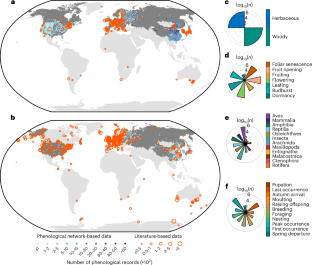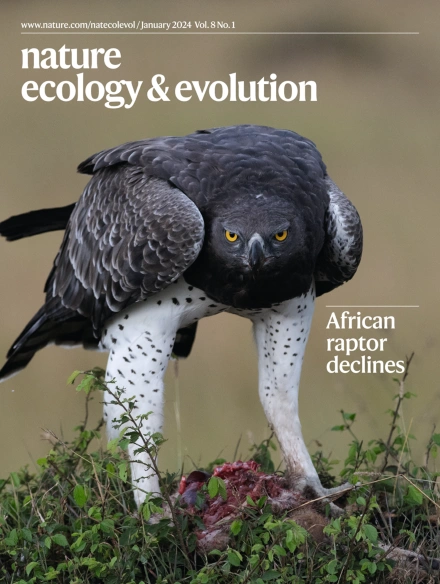Phenological divergence between plants and animals under climate change
IF 13.9
1区 生物学
Q1 ECOLOGY
引用次数: 0
Abstract
Climate change has altered the timing of recurring biological cycles in both plants and animals. Phenological changes may be unequal within and among trophic levels, potentially impacting the intricate interactions that regulate ecosystem functioning. Here we compile and analyse a global dataset of terrestrial phenological observations, including nearly half a million time series for both plants and animals. Our analysis reveals an increasing phenological asynchronization between plants and animals from 1981 to 2020, with a stronger overall advancement of late-season phenophases for plants than for animals. Almost 30% of temporal variations in plant phenophases can be explained by the timing of the preceding phenophases. This temporal dependency allows the advancement caused by warming to accumulate and propagate through seasons, advancing later phenophases more than earlier phases. By contrast, animals rely on various environmental cues and resource-tracking strategies to initiate their life-cycle activities, which weakens their cross-phenophase linkage and undermines the effect of warming. Our results suggest that future warming may increase phenological asynchronization between plants and animals and potentially disturb trophic interactions and ecosystem stability. Climate change is inducing widespread shifts in the phenology of terrestrial organisms. This global analysis reveals a growing asymmetry between plant and animal responses, with more pronounced phenological shifts in plants.


气候变化下动植物物候差异研究
气候变化改变了动植物生物循环的时间。物候变化在营养水平内部和之间可能是不平等的,可能影响调节生态系统功能的复杂相互作用。在这里,我们编译和分析了陆地物候观测的全球数据集,包括近50万个植物和动物的时间序列。我们的分析表明,从1981年到2020年,植物和动物之间的物候不同步性增加,植物的季末物候期总体上比动物提前。植物物候期近30%的时间变化可以用前一个物候期的时间来解释。这种时间依赖性使得变暖引起的进展在季节中积累和传播,使后期物候期比早期物候期推进得更多。相比之下,动物依靠各种环境线索和资源跟踪策略来启动其生命周期活动,这削弱了它们的跨物候联系,破坏了变暖的影响。我们的研究结果表明,未来的变暖可能会增加植物和动物之间的物候不同步,并可能破坏营养相互作用和生态系统的稳定性。
本文章由计算机程序翻译,如有差异,请以英文原文为准。
求助全文
约1分钟内获得全文
求助全文
来源期刊

Nature ecology & evolution
Agricultural and Biological Sciences-Ecology, Evolution, Behavior and Systematics
CiteScore
22.20
自引率
2.40%
发文量
282
期刊介绍:
Nature Ecology & Evolution is interested in the full spectrum of ecological and evolutionary biology, encompassing approaches at the molecular, organismal, population, community and ecosystem levels, as well as relevant parts of the social sciences. Nature Ecology & Evolution provides a place where all researchers and policymakers interested in all aspects of life's diversity can come together to learn about the most accomplished and significant advances in the field and to discuss topical issues. An online-only monthly journal, our broad scope ensures that the research published reaches the widest possible audience of scientists.
 求助内容:
求助内容: 应助结果提醒方式:
应助结果提醒方式:


